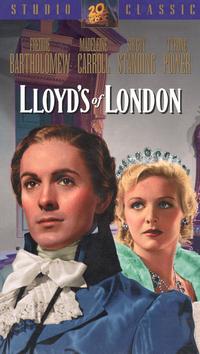
LLOYDS OF LONDON
US, 1936, 115 minutes, Black and white.
Freddie Bartholomew, Madeleine Carroll, Guy Standing, Tyrone Power, C. Aubrey Smith, Virginia Field, George Sanders, J.M. Carrigan, Una O’ Connor, E.E. Clive.
Directed by Henry King.
Lloyds of London is an entertaining historical drama – more fiction than history. It focuses on the friendship between Jonathan Blake and Horatio Nelson. While the Battle of Trafalgar is significant, most of the action of the film takes place afterwards, the establishing of the insurance firm of Lloyds of London. It focuses on business enterprise at the time, the issues of honesty and integrity, doing the right thing.
Tyrone Power was emerging as a hero of action adventures at 20th Century Fox in the mid-1930s. George Sanders was also emerging as the actor whom one relied on if one wanted a cad. Madeleine Carroll is the heroine – who appeared in films for Cecil B. de Mille as well as in Hitchcock’s The Thirty Nine Steps.
The film has a very strong supporting cast from character actors very popular in the 1930s.
The direction is by Henry King who had been directing films from 1915. in the mid-30s he moved into his stride as a top director at 20th Century Fox with a range of films in variety such as Alexander’s Ragtime Band, Jesse James, Stanley and Livingstone. During the 1940s he directed The Song of Bernadette and Wilson. He directed Tyrone Power in a number of films including Alexander’s Ragtime Band, A Yank in the RAF, Captain From Castille. King continued to direct films during the 1950s, more colourful films like David and Bathsheba and The Snows of Kilimanjaro. In his last year of directing he made Carousel, Hemingway’s The Sun Also Rises as well as the story of F. Scott Fitzgerald, Beloved Infidel and his version of Tender is the Night.
1. This film was made in 1936. How enjoyable is it today? Why? Has it dated? How is it obviously a film of its times? How would a film of this theme be made today?
2. How interesting was this film as history? Did you feel it was authentic? Or contrived? What is the value of portraying the origins of Lloyds of London on the screen?
3. How real a picture of England at the end of the Eighteenth Century did the film give? The film was episodic and gave incidents rather than continued narrative. What insight into England and its heritage did the film give? Which sequences best illustrated this?
4. What were your final impressions of Lloyds of London and its importance for England and for the world? How did Lloyds draw on the English heritage and values? How were they employed in these years? How would this heritage be handed on? What values of enterprise and integrity did Lloyds stand for? How was this illustrated in the film?
5. Did the film successfully intertwine the stories of Jonathan Blake and Horatio Nelson? Their boyhood and closeness, their lack of closeness during life, and yet Nelson's final dependence on Blake and his hoax? Was this convincing - realistically, dramatically, both?
6. Did the sequences of the boys' youth make a convincing prologue for the film? Their sense of adventure, the exploration of the pirates and their deal$? The contrast between Nelson's nobility and Blake’s poverty? Their bonds together? Nelson's going to the Navy? Blake’s going to London?
7. How was ‘doing the right thing’ an important theme for the film? Jonathan's initial going to London to do the right thing? His going to Jukes and doing the wrong thing? How did this form a background for his final hoaxing of the people? The importance of Mr. Angerstein for Lloyds, for Blake and his promotion? The picture of work in
London at the time, the Navy background and trading background of Lloyds, classes in London, integrity and villainy, Jukes? Principles etc.?
8. Comment on the portrayal of the making of the syndicates, on Blake’s journeys in France and his escape. Did these fit in integrally with the film? Blake presented as a good Englishman? His relationship to Elizabeth?
9. Were the personal sides of the film as well handled as the Lloyds side? Blake’s relationship to Polly? Her contrast with Elizabeth Stacey? Why was Blake infatuated with Elizabeth Stacey? Did he love her? Comment on the incidents when they encountered one another, and their blending into the plot of the whole film and the work of Lloyds. Lord Stacey as an aristocratic villain? His use of Blake, his arrogance and use of his class and wealth?
10. What belief did Jonathan Blake have in Lloyds and in England? Was this realistically portrayed? Over-dramatically? The tone of patriotism? Was he entitled to perpetrate the fraud? Was it justified in the event? Did the people who knew make the right decisions? Mr. Angerstein? The threat of Stacey's exposure?
11. How successful was the dramatic intertwining of Trafalgar and Blake’s being shot? The contrast of Nelson and Blake? The role that Blake had played? The contrast for Stacey and for Elizabeth?
12. How important was the sense of victory when the hoax was perpetrated? The relief when Blake was vindicated? Did this end justify the means?
13. How important was the sense of time and atmosphere for this film? Was it an important historical film? Or principally an enjoyable one?